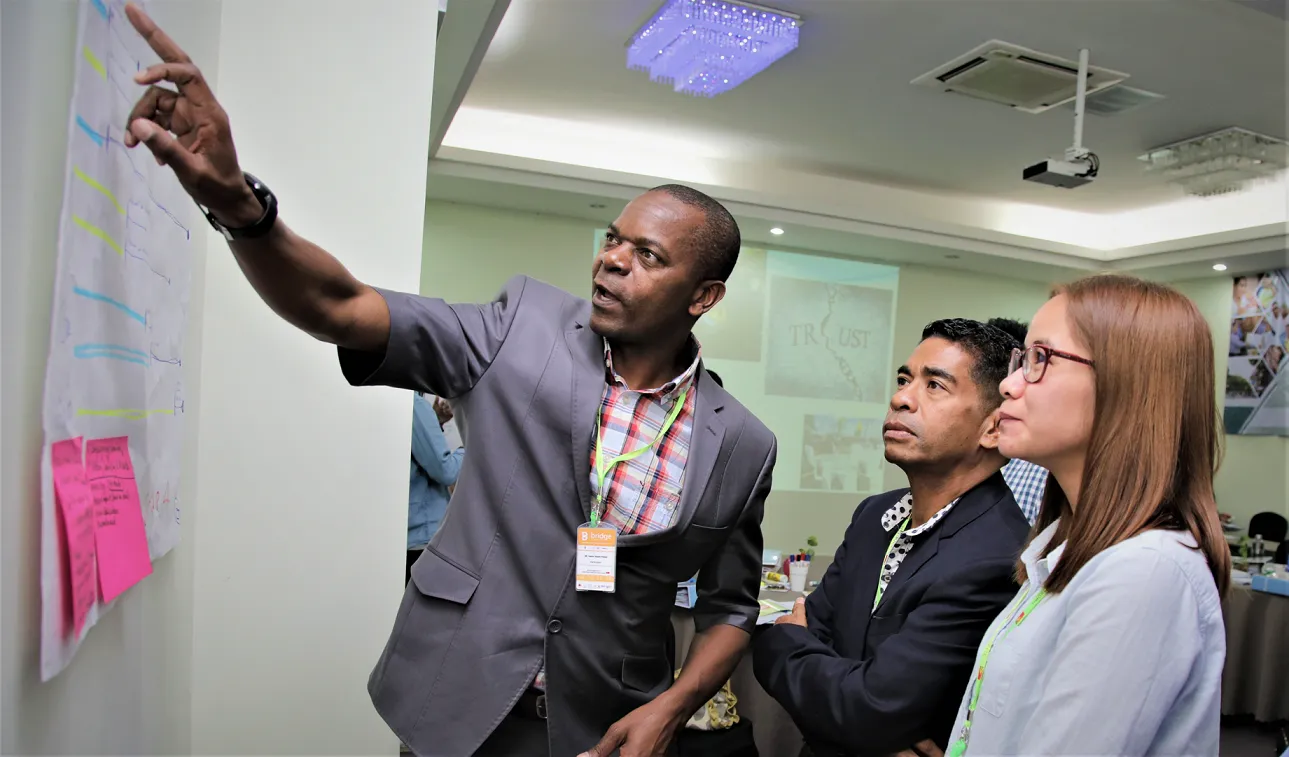Training, Education and Research in Electoral Administration: Investing in excellence

Training is the process of learning the skills you need to do a particular job or activity. For election officials, training organized by electoral management bodies (EMBs) can be geared towards election procedures before, during or after elections; or be part of staff's lifelong learning to maintain and improve the professional competence of staff. Beyond their staff, several EMBs also train or educate other stakeholders such as political parties and candidates, members of the press, judges, security sector officials and the general public.
Many EMBs engage in training on a regular and frequent basis. Some EMBs such as Australia, Sweden and the UK have adopted compulsory training for poll workers. The Central Election Commission of Georgia has gone a step further and introduced certification requirements for election administrative officials who have been politically appointed.
To accommodate these and other training requirements related to the staff and other stakeholders, EMBs are increasingly investing in high-quality training and educational programmes run by professional educators who use innovative hands-on practice, activity and scenario-based learning methodologies. Moreover, a large number of EMBs have established fit-for-purpose training and education facilities. Examples include the Australian Election Commission (AEC) learning facility that includes classrooms and simulation rooms, and the Election Commission of India’s, Indian International Institute for Democracy and Electoral Management (IIIDEM), with its 12,500 sqm facility dedicated to training election officials from around the country and from abroad.
During the last 30 years, at least 38 EMBs have established dedicated electoral training and education centres (see Table 1). These centres are either incorporated within the existing EMB structure or as a separate wing with functional or administrative autonomy.
Table 1. Electoral Training, Education and Research Centres by country and year established
Country |
Year established |
Name |
Argentina |
2009 |
School for Training and Electoral Education, National Electoral Chamber |
Australia |
2009 |
National Electoral Education Centre, Australian Election Commission* |
Australia |
1992 |
Electoral Education Centre, Western Australian Election Commission* |
Bangladesh |
1995 |
Electoral Training Institute, Election Commission of Bangladesh |
Bolivia |
2018 |
Institute for Intercultural Democracy, Supreme Electoral Tribunal |
Bosnia and Hercegovina |
2017 |
Education Center for Elections, Central Election Commission |
Brazil |
2002 |
Electoral Judicial School, Superior Electoral Court |
Colombia |
2007 |
Center for Studies in Democracy and Electoral Affairs, National Registry |
Costa Rica |
2009 |
Institute for Training and Studies in Democracy, Supreme Tribunal of Elections |
Dominican Republic |
2007 |
National School of Electoral and Civil State Training, Central Election Board |
Ecuador |
2012 |
Institute of Democracy, National Electoral Council |
Fiji |
2015 |
Fijian Electoral Education Centre, Fijian Electoral Office |
Georgia |
2009 |
Electoral Systems Development Reform and Training Centre, Central Election Commission |
Ghana |
2016 |
Training School, Electoral Commission of Ghana |
Guatemala |
2011 |
Electoral Institute, Supreme Electoral Tribunal |
Hong Kong |
1999 |
Electoral Information Centre, Registration and Electoral Office* |
India |
2011 |
International Institute of Democracy and Election Management, Election Commission of India |
India |
2018 |
Institute of Democracy & Elections for Good Governance, State Election Commission Maharastra |
Iraq |
2017 |
Institute of Electoral Education, Independent High Electoral Commission of Iraq |
Jordan |
2017 |
Jordan Electoral Training and Research Institute, Independent Electoral Commission of Jordan |
Kyrgyzstan |
2013 |
Center for Training and Electoral Technologies, Central Election Commission |
Malaysia |
2007 |
Election Academy, Election Commission of Malaysia |
Mexico |
1995 |
School for Electoral Judicial Training, Electoral Tribunal |
Mexico |
2010 |
International Centre for Election Training and Research, National Electoral Institute |
Moldova |
2013 |
The Center for Continuous Electoral Training, Central Election Commission |
Nepal |
2011 |
Electoral Education and Training Centre, Election Commission of Nepal |
Nigeria |
2005 |
The Electoral Institute, Independent National Electoral Commission |
Pakistan |
2019 |
Federal Election Academy, Electoral Commission of Pakistan |
Panama |
2014 |
Institute for Democratic Studies, Electoral Court |
Paraguay |
1997 |
Center for Information, Documentation and Electoral Education, Supreme Electoral Tribunal |
Peru |
2005 |
Electoral and Governance School, National Jury of Elections |
Peru |
2002 |
Registration School, National Registry of Identification and Civil Status |
Russia |
1994 |
Electoral Technologies Training Centre, Central Election Commission |
South Korea |
1996 |
Korean Centre for Civic Education and Democracy, National Electoral Commission |
Thailand |
2006 |
Democratic Education Center, Election Commission of Thailand* |
Ukraine |
2007 |
Joint IFES-CEC Administrative Center for Training of Election Process Participants |
Venezuela |
2011 |
Institute of High Studies of the Electoral Power, National Electoral Council |
Zambia |
2012 |
Voter Education Information and Research Centre, Electoral Commission of Zambia |
Source: Author, constructed using information from EMB websites, social media and reports. Note: centres marked with asterisk focus on electoral and civic education only.
Many of these centres (as well as EMB departments or units) go beyond training and professional development, with voter and civic education and/or research functions as well (see multimedia report).
Many practitioners agree that training, education and research are investments for ensuring successful elections (see New Delhi Statement). Training promotes professionalism within the EMB and trust among the voters. Voter and civic education support a vision of elections as a public good and societal endeavour. Research and analysis contribute to both innovation and adaptation and support institutional resilience.
How and why some EMBs decide to establish a centre or instead strengthen existing structures will depend on the country and electoral context. To explore available options, International IDEA has published a series of diverse country case studies that aim to contribute to a better understanding of the dynamics related to opening and operating an electoral training and education facility in different environments. Each case study takes a similar approach by focusing on the facility's beginnings, first years of operations as well as the years of development and expansion. The case studies are aimed at policymakers and practitioners involved in EMB design with a focus on operational training, professional development, voter and civic education, and research:
Case Study 1 - Electoral Training and Education: The Case of IIIDEM in India (27 May 2021)
Case Study 2 - Electoral Training and Education: The Case of the Electoral Institute in Nigeria (27 May 2021)
Case Study 3 - Electoral Training and Education: The Case of the Centre for Continuous Electoral Training in Moldova (27 May 2021)
Cast Study 4 - Electoral Training and Education: The Case of the Information and Electoral Education Unit, ONPE Peru (27 May 2021)
Cast Study 5 and 6 - Electoral Training and Education: The Case of the National Training and Education Unit and the National Electoral Education Centre, Australian Election Commission (forthcoming).




